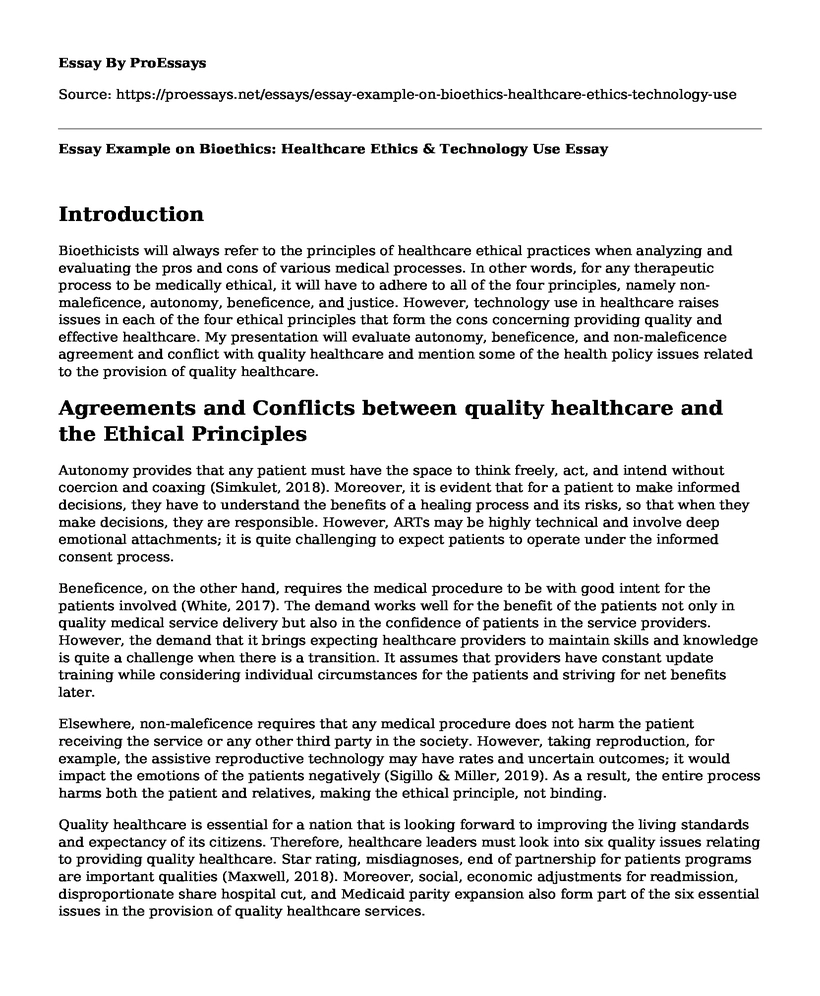Introduction
Bioethicists will always refer to the principles of healthcare ethical practices when analyzing and evaluating the pros and cons of various medical processes. In other words, for any therapeutic process to be medically ethical, it will have to adhere to all of the four principles, namely non-maleficence, autonomy, beneficence, and justice. However, technology use in healthcare raises issues in each of the four ethical principles that form the cons concerning providing quality and effective healthcare. My presentation will evaluate autonomy, beneficence, and non-maleficence agreement and conflict with quality healthcare and mention some of the health policy issues related to the provision of quality healthcare.
Agreements and Conflicts between quality healthcare and the Ethical Principles
Autonomy provides that any patient must have the space to think freely, act, and intend without coercion and coaxing (Simkulet, 2018). Moreover, it is evident that for a patient to make informed decisions, they have to understand the benefits of a healing process and its risks, so that when they make decisions, they are responsible. However, ARTs may be highly technical and involve deep emotional attachments; it is quite challenging to expect patients to operate under the informed consent process.
Beneficence, on the other hand, requires the medical procedure to be with good intent for the patients involved (White, 2017). The demand works well for the benefit of the patients not only in quality medical service delivery but also in the confidence of patients in the service providers. However, the demand that it brings expecting healthcare providers to maintain skills and knowledge is quite a challenge when there is a transition. It assumes that providers have constant update training while considering individual circumstances for the patients and striving for net benefits later.
Elsewhere, non-maleficence requires that any medical procedure does not harm the patient receiving the service or any other third party in the society. However, taking reproduction, for example, the assistive reproductive technology may have rates and uncertain outcomes; it would impact the emotions of the patients negatively (Sigillo & Miller, 2019). As a result, the entire process harms both the patient and relatives, making the ethical principle, not binding.
Quality healthcare is essential for a nation that is looking forward to improving the living standards and expectancy of its citizens. Therefore, healthcare leaders must look into six quality issues relating to providing quality healthcare. Star rating, misdiagnoses, end of partnership for patients programs are important qualities (Maxwell, 2018). Moreover, social, economic adjustments for readmission, disproportionate share hospital cut, and Medicaid parity expansion also form part of the six essential issues in the provision of quality healthcare services.
Conclusion
Ethical principles are essential and more significantly authoritative because they give the patients a sense of authority to ensure the services provided are satisfactory of good quality. On the contrary, they may work against their intended purposes or may make the provider overwhelmed. Healthcare leaders should, therefore, understand the ethical, positive, and negative sides to know how to handle the quality mentioned above issues.
References
Maxwell, H. M. (2018). The Impact of Misdiagnosis on Psychological Well-Being: Lessons from Celiac Disease (Doctoral dissertation, John F. Kennedy University).
Sigillo, A. E., & Miller, M. K. (2019). Assisted Reproduction: Conceptions, Controversies, and Community Sentiment. Lexington Books.
Simkulet, W. (2018). Nudging informed consent and bullshit. Journal of medical ethics, 44(8), 536-542.
White, P. M. (2017). "One for Sorrow, Two for Joy?": American embryo transfer guideline recommendations, practices, and outcomes for gestational surrogate patients. Journal of assisted reproduction and genetics, 34(4), 431-443.
Cite this page
Essay Example on Bioethics: Healthcare Ethics & Technology Use. (2023, Apr 06). Retrieved from https://proessays.net/essays/essay-example-on-bioethics-healthcare-ethics-technology-use
If you are the original author of this essay and no longer wish to have it published on the ProEssays website, please click below to request its removal:
- Paramedic Retrospective Analysis
- Social Learning and the Virtual World Literature Review Paper Example
- The Gluteus Maximus: A Powerful Muscle for Upright Posture - Essay Sample
- Brain: The Control Center of Our Lives - Essay Sample
- Essay Sample on Comparing the Structures and Functions of Reptilian and Mammalian Hearts
- Paper Example on Hyaline Cartilage
- Report Sample on Evaluating Effectiveness of New Technologies







